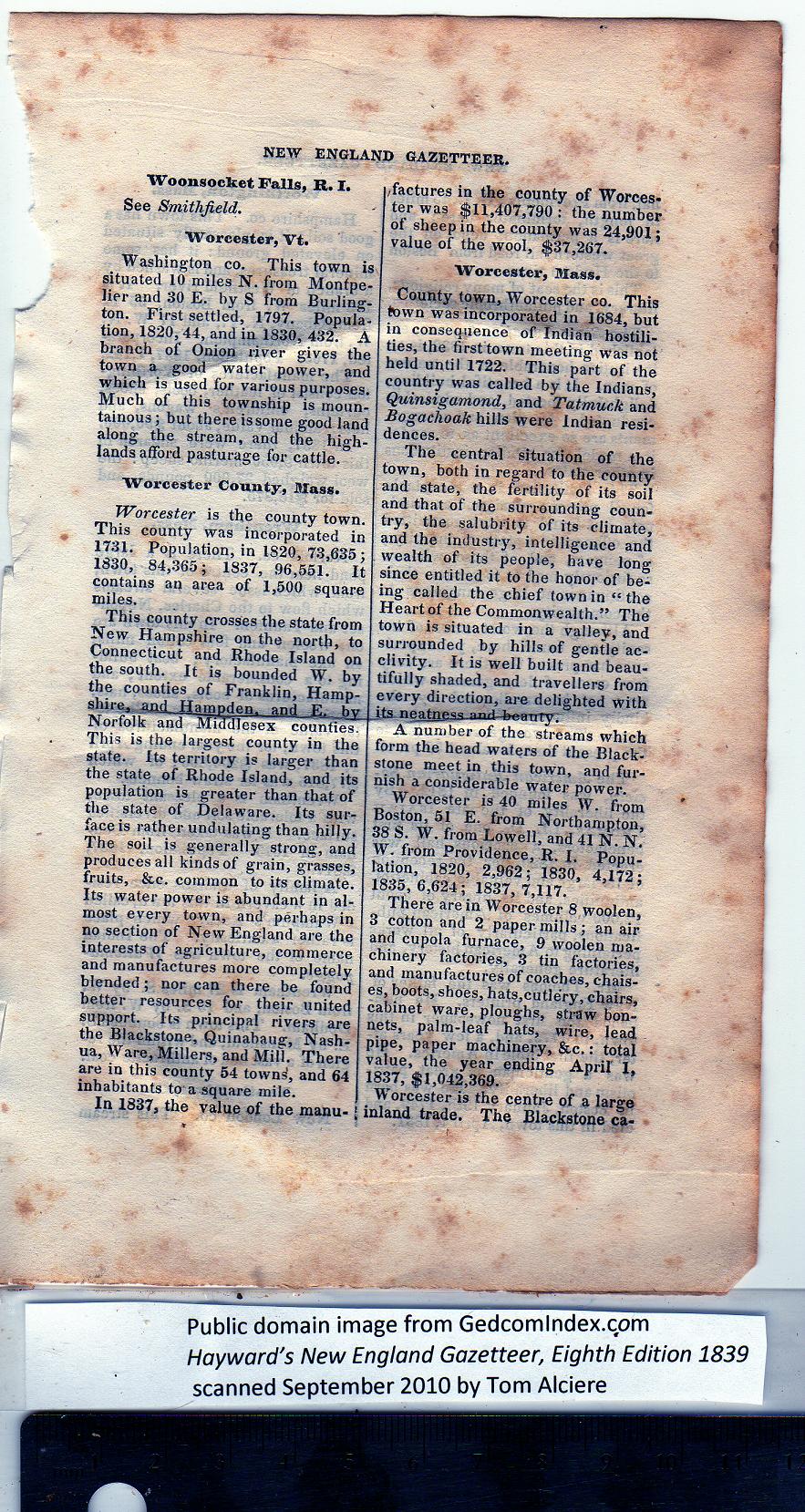|
Woonsocket Falls, R. I1
See Smithfield.
Worcester, Vt.
Washington co. This town is
situated 10 miles N. from Montpe-
lier and 30 E. by S from Burling-
ton. First settled, 1797. Popula-
tion, 1820,44, and in 1830, 432. A
branch of Onion river gives the
town a good water power, and
which is used for various purposes.
Much of this township is moun-
tainous; but there is some good land
along the stream, and the high-
lands afford pasturage for cattle.
Worcester County, Mass.
Worcester is the county town.
This county was incorporated in
1731. Population, in 1820,73,635;
1830, 84,365; 1837, 96,551. It
contains an area of 1,500 square
miles.
This county crosses the state from
New Hampshire on the north, to
Connecticut and Rhode Island on
the south. It is bounded W. by
the counties of Franklin, Hamp-
shire. and Hampden., and E. by
Norfolk and Middlesex counties.
This is the largest county in the
state. Its territory is larger than
the state of Rhode Island, and its
population is greater than that of
the state of Delaware. Its sur-
face is rather undulating than hilly.
The soil is generally strong, and
produces all kinds of grain, grasses,
fruits, &c. common to its climate.
Its water power is abundant in al-
most every town, and perhaps in
no section of New England are the
interests of agriculture, commerce
and manufactures more completely
blended ; nor can there be found
better resources for their united
support. Its principal rivers are
the Blackstone, Quinabaug, Nash-
ua, Ware, Millers, and Mill. There
are in this county 54 town^, and 64
inhabitants to a square mile.
In 1837, the value of the manu- [ |
/factures in the county of Worces-
ter was $11,407,790 : the number
of sheep in the county was 24,901;
value of the wool, $37,267.
Worcester, Mass.
County town, Worcester co. This
town was incorporated in 1684, but
in consequence of Indian hostili-
ties, the first town meeting was not
held until 1722. This part of the
country was called by the Indians,
Quinsigamond, and Tatmuck and
Bogachoak hills were Indian resi-
dences.
The central situation of the
town, both in regard to the county
and state, the fertility of its soil
and that of the surrounding coun-
try, the salubrity of its climate,
and the industry, intelligence and
wealth of its people, have long
since entitled it to the honor of be-
ing called the chief town in “the
Heart of the Commonwealth.” The
town is situated in a valley, and
surrounded by hills of gentle ac-
clivity. It is well built and beau-
tifully shaded, and travellers from
every direction, are delighted with
JtS neatP^S0 »nA-l»mnfy
A number of the streams which
form the head waters of the Black-
stone meet in this town, and fur-
nish a considerable water power.
Worcester is 40 miles W. from
Boston, 51 E. from Northampton,
38 S. W. from Lowell, and 41 N. N.
W. from Providence, R. I. Popu-
lation, 1820, 2,962; 1830, 4,172;
1835, 6,624; 1837, 7,117.
There are in Worcester 8 woolen,
3 cotton and 2 paper mills; an air
and cupola furnace, 9 woolen ma-
chinery factories, S tin factories,
and manufactures of coaches, chais-
es, boots, shoes, hats,cutlery, chairs,
cabinet ware, ploughs, straw bon-
nets, palm-leaf hats, wire, lead
pipe, paper machinery, &c.: total
value, the year ending April 1,
1837, $1,042,369.
Worcester is the centre of a large
inland trade. The Blackstone ca- |
